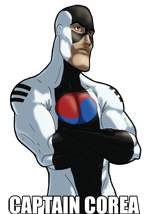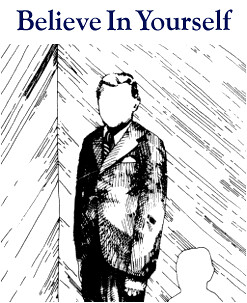| View previous topic :: View next topic |
| Author |
Message |
samd
Joined: 03 Jan 2007
|
 Posted: Tue Oct 16, 2007 4:51 am Post subject: Korean Politics - Cliff Notes Posted: Tue Oct 16, 2007 4:51 am Post subject: Korean Politics - Cliff Notes |
 |
|
With an election coming up I realise I know absolutely nothing about Korean politics.
Anyone able to give me a quick rundown? |
|
| Back to top |
|
 |
Captain Corea

Joined: 28 Feb 2005
Location: Seoul
|
 Posted: Tue Oct 16, 2007 5:18 am Post subject: Posted: Tue Oct 16, 2007 5:18 am Post subject: |
 |
|
Kim Dae Jung (who fought for many years fo democracy in Korea) had a political party and became president in 1997. He built up his presidency on aplatform of engagement with the North.
Noh Moo-Hyun was elected in 2002 as a continuation of that legacy and on a anti-American ticket. He and his supporters soon bolted from Kim's party and formed their own (Uri Dang).
Noh appointed loyal supporters to key ministerial positions during his presidency. Because of lackluster performance in many areas, and the public's increasing demands, his support rate fell to below 10% and he resigned from his own party.
His previous supporters have now formed a new party and are tryingto once again hold on to the presidency by championing the left. Chung Dong Young is leading this camp thus far.
On the more conservative end, the GNP has been the bulkwark of the right. They are tied to many of the dictators of old, but have recently tried to reform their image into thatof social conservatism and economic expansionism.
Their current leader is Lee Myung Bak, the ex-mayor of Seoul. He is polling at about 50% support right now but is weathering blistering attacks about his integrity (he was a CEO for years and is tied to billions is fraud).
Sk politics is a rollercoaster. They'll be a few more ups and downs before the end comes. |
|
| Back to top |
|
 |
Unposter
Joined: 04 Jun 2006
|
 Posted: Tue Oct 16, 2007 5:34 am Post subject: Posted: Tue Oct 16, 2007 5:34 am Post subject: |
 |
|
What Captain Corea said but I would add that Noh Moo Yun and the Ouri-dang or whatever they call themselves also championed free trade.
And, Kim DeJung also oversaw Korea's economic recovery after the '97 crisis. |
|
| Back to top |
|
 |
xtchr
Joined: 23 Nov 2004
|
 Posted: Tue Oct 16, 2007 5:39 am Post subject: Posted: Tue Oct 16, 2007 5:39 am Post subject: |
 |
|
How does the voting work? Do you vote for a representative in your province? Or just a national one?
Do you vote for a person, or a party, or both? i.e first past the post, or MMP?
Is it compulsory to vote?
Thanks. |
|
| Back to top |
|
 |
mikekim
Joined: 11 Aug 2006
|
 Posted: Tue Oct 16, 2007 5:43 am Post subject: Posted: Tue Oct 16, 2007 5:43 am Post subject: |
 |
|
Well seeing as the politicians/wealthy here are above the law, whomever is president will have to be crafty and crooked.
I am interested in their educational policies though. This "everybody gets the same education" crap is so useless. top 5% of students are bored and could probably take the CSAT in first year. Bottom feeders might as well go straight to craphole college to learn flowering arranging and handphone selling. |
|
| Back to top |
|
 |
Unposter
Joined: 04 Jun 2006
|
 Posted: Tue Oct 16, 2007 5:49 am Post subject: Posted: Tue Oct 16, 2007 5:49 am Post subject: |
 |
|
It is fairly similar to the U.S. though definately not completely. They have a one chamber legislative branch where National Assemblypeople represent districts. You vote directly for the president. The President holds most of the power thought the Constitutional Court has made a few setbacks for the Roh government. For example, Roh did not challange their somewhat suspicious decisions such as that the capital cannot be moved from Seoul because it was the capital during the Chosun so therefore it cannot be moved...ever!
Voting is not compulsary but there is a fairly high turnout. It is all computerized and the talleys are publicized shortly after the polls close.
During this election, the two main parties for the first time have tried to have primary elections in order to determine their Presidential candidates.
Remember, they have had democracy since something like 1994 so it is all still sorting itself out. |
|
| Back to top |
|
 |
Ya-ta Boy
Joined: 16 Jan 2003
Location: Established in 1994
|
 Posted: Tue Oct 16, 2007 2:04 pm Post subject: Posted: Tue Oct 16, 2007 2:04 pm Post subject: |
 |
|
The Grand National Party is hoping to regain the presidency after 10 years out of power. They are the 'conservative' party here, but be careful not to over-do the label--it doesn't exactly follow Western political concepts. The GNP does favor business and has close ties with the chaebols. They were originally an anti-communist party. They are still, as far as that is applicable. They are not particularly social conservatives. Neither party is, as far as I can tell. Both support women, etc. In terms of foreign policy, they favor continuing the US alliance.
The Uri Party morphed into the New United Democratic Party (same people, new name--it happens every election). They are 'progressive' (the term used here) in that they favor labor over the chaebols. Some members at least would like to strip the chaebols because the owning families got started under the Japanese. At the beginning of the Roh's administration, there was a lot of talk about redistributing income and sharing the pie, not much about expanding the pie. That didn't happen because their electoral victory was due to support from the young who wanted jobs.
Their foreign policy aims at independence from everyone, especially the US and they talk about being a balancer in NE Asia. Central to ALL of their thinking is reunification. Everything else, and I do mean everything, is subordinate to that goal. They give the impression that they wouldn't mind at all if Kim Jong-Il became president of both North and South. While the GNP seems to be nationalistic, the New United Democratic Party seems to be super-nationalistic. |
|
| Back to top |
|
 |
Scotticus
Joined: 18 Mar 2007
|
 Posted: Tue Oct 16, 2007 3:04 pm Post subject: Posted: Tue Oct 16, 2007 3:04 pm Post subject: |
 |
|
| mikekim wrote: |
I am interested in their educational policies though. This "everybody gets the same education" crap is so useless. top 5% of students are bored and could probably take the CSAT in first year. Bottom feeders might as well go straight to craphole college to learn flowering arranging and handphone selling. |
How is this different from any other system? How many public school systems challenge the top 5% while giving the "bottom feeders" the support they need to succeed? Here's your answer: none. Public schools are utilitarian... their job is to educate the majority of students.
Seeing as you're so vehement about it, how exactly would your system work? |
|
| Back to top |
|
 |
ajgeddes

Joined: 28 Apr 2004
Location: Yongsan
|
 Posted: Tue Oct 16, 2007 3:23 pm Post subject: Posted: Tue Oct 16, 2007 3:23 pm Post subject: |
 |
|
| Great info guys! |
|
| Back to top |
|
 |
faster

Joined: 03 Sep 2006
|
 Posted: Tue Oct 16, 2007 3:56 pm Post subject: Posted: Tue Oct 16, 2007 3:56 pm Post subject: |
 |
|
An interesting (and unhealthy IMO) development is that there is now only ONE "permanent" party, the GNP (Hannara-ddang).
Traditionally, Korea has been led by personal politics: a candidate starts a party, when he's out, so's the party. This is what's happened with Roh -- his associates are trying as hard as they can to disassociate themselves with him and the Uri party. Of course they've formed a new party, but the GNP remains.
Park Geun-Hye, daughter of dictatorial president Park Chung-hee, runs the GNP very well and did a great job opposing Roh (not that he did much to help himself, to be fair). Park, the "George W. Bush of Korea" has positioned the GNP to dominate Korean politics for a generation. |
|
| Back to top |
|
 |
samd
Joined: 03 Jan 2007
|
 Posted: Tue Oct 16, 2007 9:38 pm Post subject: Posted: Tue Oct 16, 2007 9:38 pm Post subject: |
 |
|
Thanks a lot!
Great info, exactly what I wanted to know. |
|
| Back to top |
|
 |
|

